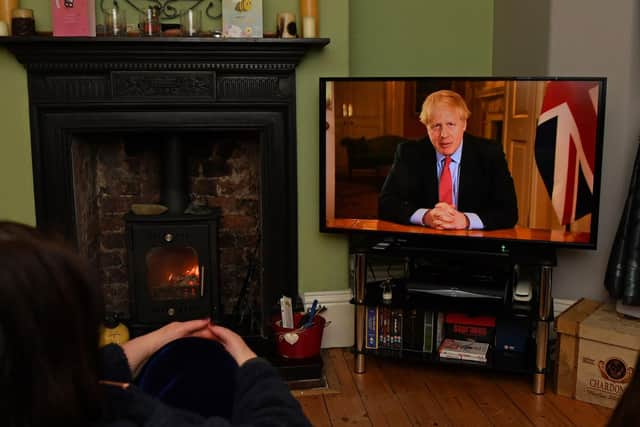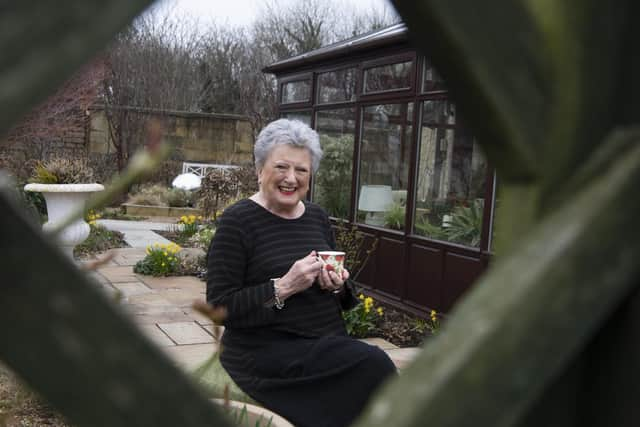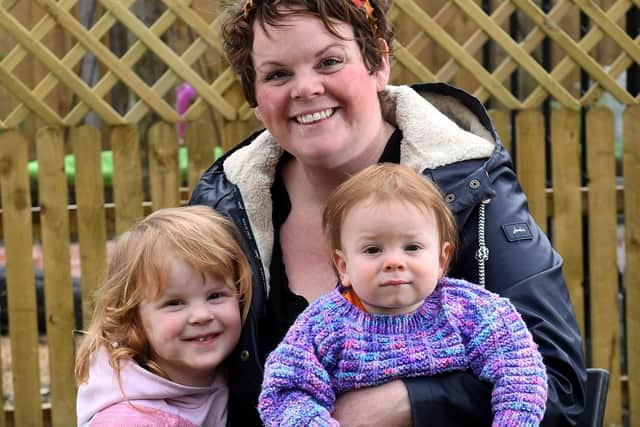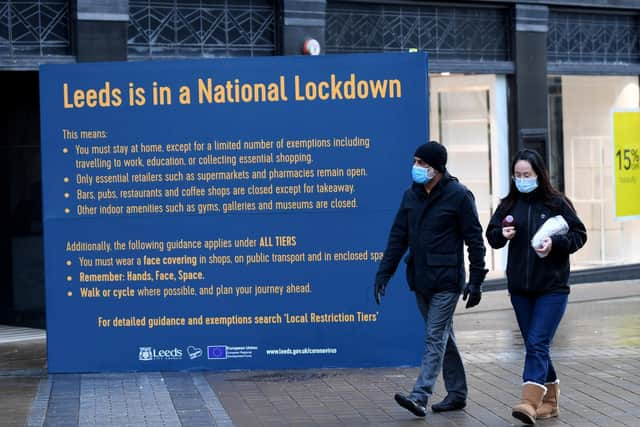"I was really frightened, and kept thinking of myself on a hospital ventilator" Yorkshire residents remember the impact of first coronavirus lockdown as country marks first anniversary
The announcement on the evening of Monday, March 23 last year of the first national lockdown was a moment that most people had grimly anticipated was coming.
Even so, Mr Johnson’s commands, delivered soberly in a pre-recorded address broadcast from Downing Street, formed perhaps the most palpably historic broadcast since Neville Chamberlain announced to the nation that German peace talks had broken down in 1939.
Advertisement
Hide AdAdvertisement
Hide AdIt signalled the beginning for a new and restricted way of life for people across Yorkshire and the rest of the UK.


A year on, and the words “stay home, protect the NHS and save lives” are a slogan known to everyone.
However, the first time the public heard them was that Monday night as virtually every freedom was curtailed in the cause of stopping the spread of the new and deadly coronavirus.
The public was told that they could only leave their homes to take exercise once a day, to shop for essential items, medical reasons, or to give care to those who needed it.
Advertisement
Hide AdAdvertisement
Hide AdPubs had already been emptied and schools closed, and the “stay at home” command put paid to all but the most essential contact with friends and family.


Few could have imagined then that a year on, the nation would still be governed by almost those exact same instructions, albeit with restrictions being lifted and then tightened at various points throughout the year.
With over 25 million people now having had at least one dose of a vaccine against the disease, and the Prime Minister’s roadmap cautiously heralding a return to normality by the summer, it is easy to forget the confusion and, in some cases, panic of those early days, particularly for those vulnerable to the virus.
“I was really frightened, and kept thinking of myself on a hospital ventilator,” remembered Jennifer Roberts, a 73-year-old retired secretary from Allerton Bywater, near Castleford.
Advertisement
Hide AdAdvertisement
Hide AdMrs Roberts, a mother-of-one and grandmother-of-three, has chronic obstructive pulmonary disease and was told along with 2.2m others that she needed to shield.


She was on holiday with her husband, Geoffrey, in Spain when she first became aware that she might be vulnerable to the virus.
She said: “Everyone was starting to worry, and I had a feeling I was going to get the letter. I had started shielding myself by the official lockdown announcement.”
Mrs Roberts did receive a letter from the NHS recommending that she go into shielding, where she remained for 22 weeks - well into the summer when restrictions began to ease.
Advertisement
Hide AdAdvertisement
Hide AdShe said: “My granddaughter Grace did all my shopping for me, I couldn’t even give her a hug.


“We were washing our hands all the time. I didn’t want to take any chances.”
Like so many, Mrs Roberts struggled with the emotional impact of being isolated from her friends and wider family.
She said: “There were times I walked around the house crying, and I didn’t know why.
Advertisement
Hide AdAdvertisement
Hide Ad“We spent time doing jigsaw puzzles in the garden, and once a week we got in the car and went for a drive just to keep it going.
“We’d never see anyone at all.”
Mrs Roberts was back in shielding when her first great-grandchild was born in October.
“He is absolutely adorable,” she said, “We have only been able to see him once.”
Both she and her husband have now had the first dose of a vaccine at the Askham Bar park and ride site on the outskirts of York, which has been converted into a vaccination centre, and is looking forward to seeing family and friends when restrictions are lifted.
Advertisement
Hide AdAdvertisement
Hide AdShe is not the only one living with the impact of not being able to spend time with a new baby in the family.
Jenny Dalton gave birth to her third child, Wilfred, in Hull Royal Infirmary at the height of the first peak of the virus.
“Wilf’s grandparents had to come for window visits, where we just held him up. It just didn’t feel good enough, it must have been really tough for them,” she remembered.
Mrs Dalton, 37, was able to have her husband, Andy, with her when she gave birth to Wilfred, but he was not able to stay in the hospital with them for long after the baby arrived.
Advertisement
Hide AdAdvertisement
Hide AdShe said: “I’m glad Wilf was my third, my sister-in-law is expecting and my brother can’t go to scans.
“I remember thinking: ‘Am I going to have to give birth on my own, who do I leave my kids with?’
“There was no baby milk or nappies in the shop, you couldn’t get hold of Calpol.”
In the end, Mrs Dalton’s mother came to stay on their drive in her caravan to be on hand for when her daughter went into labour.
Advertisement
Hide AdAdvertisement
Hide AdShe was taken into Hull Royal Infirmary where she was treated by staff in full personal protective equipment (PPE).
Mrs Dalton said: “Obviously it was a concern that there were covid patients in the hospital, but it felt out of my hands.
“The next day, the midwife who delivered Wilf was walking towards me and smiled, but she didn’t have a mask on so I didn’t recognise her.”
After taking Wilfred home, Mrs Dalton realised there were challenges to being a new mother in the pandemic that she had not experienced with her older children that she is now reflecting on before she returns to work as a jewellery valuer next month.
Advertisement
Hide AdAdvertisement
Hide AdShe said: “To not have been able to do anything with Wilf feels quite sad. He’s almost one now and I’ve only been able to take him swimming twice.
“He’s really happy and he doesn’t have any anxiety, but I’m glad he wasn’t my first. I’m a natural worrier and you’re more relaxed by number three. He’s just missed a lot of the social side.”
However, there are millions of people across the country whose mental health has been sorely tested throughout the past year, and leaders now are faced with a new challenge in dealing with the aftermath as a shattered public emerges from the eye of the storm.
Face-to-face services for those already struggling with mental health problems stopped in the main, while people who had never found themselves struggling before felt the loneliness of isolation taking its toll.
Advertisement
Hide AdAdvertisement
Hide AdA report from the IPPR think tank released this week estimates that an additional 1.8m people will need mental health support from the NHS over the next three years as they come to terms with the ramifications of the pandemic, be that loneliness, job losses, or bereavement.
More than one in five adults with no previous experience of poor mental health now say that their mental health is poor or very poor, according to the mental health charity Mind.
“As we approach one year since the beginning of the initial lockdown, we have more and more evidence of the nation’s ‘mental health pandemic’ that we are facing,” said Geoff Heyes, the head of health policy and influencing at the charity.
“The £500m announced at the Spending Review was a welcome stopgap but without further resources, the NHS will not be able to meet the growing pressure on mental health services, and the long-term consequences of this cannot be underestimated.”